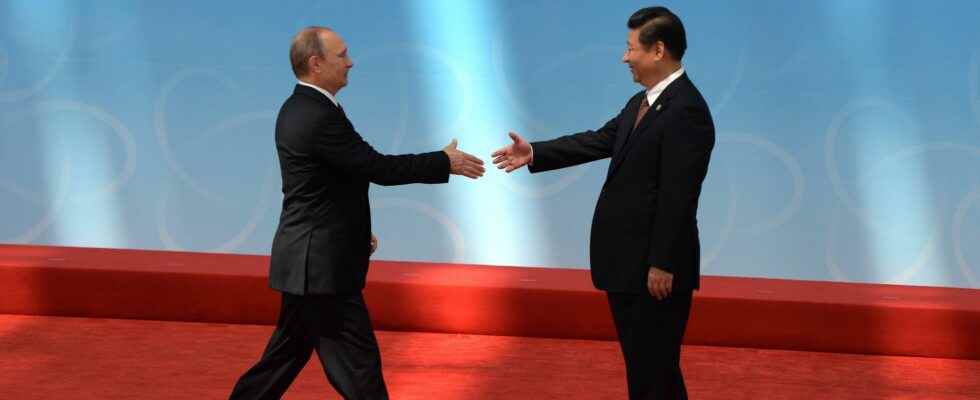The bombs are still thundering in the East. But it is not only in Ukraine that the population undergoes the warlike fantasies of a leader in lack of adrenaline. On many continents arise the spiritual heirs of Nebuchadnezzar, all passionate about martial aesthetics, having discipline as a moral code, trigger-happy, this whole feeding an ardent imperialist fever. It is because in this matter, the Putin regime can count on a good number of comrades: China with regard to Taiwan, North Korea which has its eye on its southern neighbour; closer to us, Erdogan’s Turkey, which supports various influential groups outside its borders; think again of the Islamic State, which has multiplied its incursions into the Middle East and Africa in recent years.
Raymond Aron, a sadly privileged spectator of the then alluring rise of 20th century totalitarianisms, argued that authoritarian regimes are “built by violent elites who have posited that bourgeois democracies are […] cowards”. Long live the heroic figure of the soldier, “the taste for violence”, the passion for order, and may die democracies stuck in leisure, passivity and weak morals.
Narrative oh so seductive by the vigor that crosses it. Aron thus mocked those who responded to military heroism with pacifism. “When you talk to people who profess to despise peace, you have to say that if you love peace, it’s not out of cowardice.” This is a lesson still applicable to the “right-wing poutinolâtres”, as Ferghane Azihari calls them, who have constantly condemned or weakened by their speeches French support for the Ukrainians, always arguing the need to promote “peace”, to consorts with a large part of the radical left. A facade argument, in fact, in the service of a discourse of convenience, if not of fascination with regard to the Poutinian model. In reality, democracies must respond with the same heroism. The substantial difference that sets us apart from authoritarian regimes is that we “spontaneously consent to those necessities which, elsewhere, are imposed.”
The Western masses are not insensitive to the charms of authoritarianism. The latest Cevipof study noted, for example, a clear increase in French people in favor of the establishment of an authoritarian regime (39%) to lead to more efficient political action. 27% still want the army to control the institutions. Several factors explain this phenomenon.
virtues of freedom
Rumor has it that authoritarian regimes are more efficient than our democracies, which are reputed to be bogged down in procedural red tape. Beautiful mirage. The deception was recently recalled in a text by Francis Fukuyama. Centralizing power and bringing checks and balances into line does not in any way lead to increased efficiency. The hierarchical chain, reigning by terror, is incapable of obtaining useful information for decision-making. The absence of checks and balances, if it makes it possible to accelerate the adoption of measures, leads to mediocre decisions, the result of the irresponsibility of the leaders who are not faced with any form of evaluation. We can still add an institutional organization and an administrative hierarchy not based on competence, but on the fact of the Prince, cronyism, finding a place in the small papers of the leader. We are witness to these failures: China has distinguished itself by the mediocrity of its management of the Covid and Russia by the disappointments of its armed power.
But the crisis actually seems deeper than a simple taste for efficiency. It first appears as a moral crisis. We have partly stopped believing in democracy, just as we have stopped thinking about the virtues of freedom. François Sureau will see there the mark of a growing individualism. Individuals, concerned only with their private enjoyment, renounce their right to share in political power; they thus call on the power to ensure, in the first place, their security.
Boredom can be added as a cause. Our democratic, peaceful, secular societies are profoundly prone to boredom. The preoccupations there are gloomy, the passions sluggish and for many centered on material concerns. This suggests that our guilty favors towards order and military heroism make it possible to reinstate transcendence, the common, in other words to animate a faith – a faith that is certainly irrational, but a faith.
Democracies based on legality
What makes the moral superiority of our democratic regimes is still the idea that founds it: legality, “regime where there are laws and where power is not arbitrary and without limits”. In this sense, democratic regimes are those that limit the general interest to the freedom of individuals, which denotes an essential consideration for people, not perceived only “as means of production or objects of propaganda”.
This consideration for the human person directly opposes us to authoritarian regimes on another essential aspect. Raymond Aron adds: “the thought of dictators grants an obvious primacy to foreign policy”. From the outset, it gave itself an imperialist aim. “I wanted the Empire of the world, and to ensure it, unlimited power was necessary for me”, confided Napoleon in a letter addressed to Benjamin Constant. By contrast, the Western spiritual heritage is marked by the biblical episode of the Tower of Babel. A story which, in the words of Rabbi Lord Jonathan Sacks, does not have a historical aim on the origin of human languages, but a political scope: the condemnation of the homogenization of society by an imperial and authoritarian power, symbolized by the linguistic unity of the builders of the Tower, practiced at the time by the ancient Assyrian or Mesopotamian empires. Let us try to be worthy of this heritage, by refusing the Babels of our time the right of citizenship in our minds.
*Rafaël Amselem is in charge of studies at the GenerationLibre think tank
